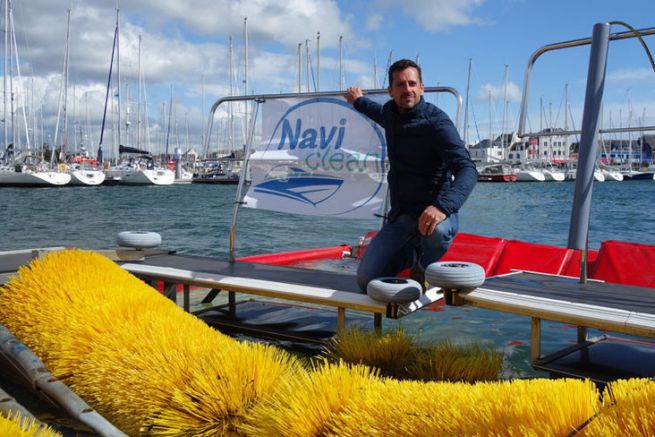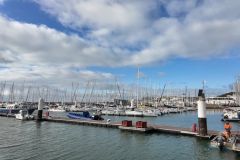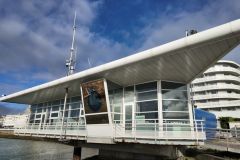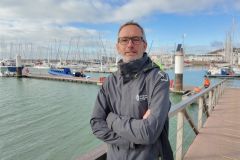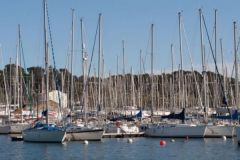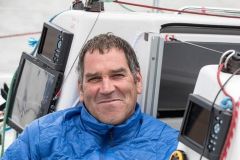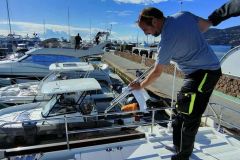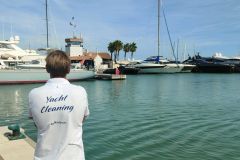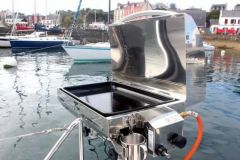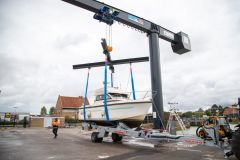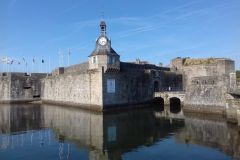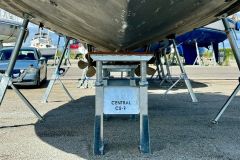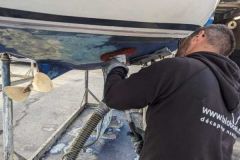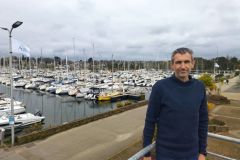Wish again
Olivier Pinon founded Naviclean in 2018. He didn't create it by chance. After spending twenty years in the purchasing field, and therefore mainly in an office, he wanted to change. For the past ten years, he has worked in the oil rig sector: an area that was not really green, from his point of view, which no longer satisfied him completely. And then the forties arrived, a professional end of the cycle undoubtedly also, the impression of having done the tour of his profession, a real attraction for boating... In short, he had enough reasons to change tack!
New professional orientation...
Olivier then started looking for a service to provide to boaters. And the idea suddenly came to him, in the middle of the night: why not the washing, like for cars? Neither one nor two, he's working on a board: a gantry like in car wash centres? The idea is attractive, but not feasible: boats have a wide variety of emerged contours and the efficiency of sensors in the marine environment is rather unlikely. Why not focus on what gets dirtiest in a boat, i.e. the hull?
Technical solution
On the internet, Olivier discovers that, yes, rollers can be a solution for this submerged part of the boats, and that it can even be combined with a high pressure wash for the deck of the boat if necessary. It also seems to him to be quite ecological: it presents itself as an alternative to the installation of antifouling, which is considered harmful to the marine environment. In short, he liked the idea and started looking for the producers of this roller machine, which had already been in existence for twenty years.
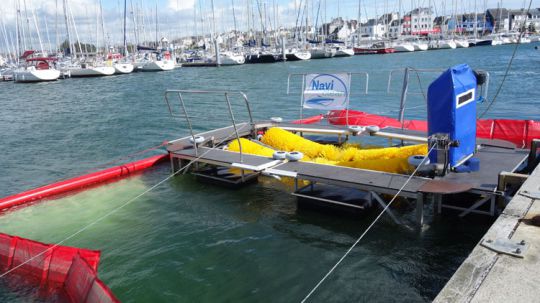
A machine from the North...
Two suppliers exist in Europe, and are located in the Nordic countries. They offer two different systems: in the first principle, the rollers move under the boat which remains motionless; in the second, the rollers are fixed and it is the boat that moves on them. Olivier is more interested in this last solution: easier to install, requiring less spatial control, and ultimately less expensive.
Brushes and pool
The machine he chooses is suitable for all hulls, motor boats and sailboats, except for the biquilles. The rollers are placed in a "V" shape around the keel, it is impossible to position them in a "W" shape. It is equipped with 3.30 m wide brushes. Made of long, thin rods of hard plastic similar to the "bristles" of street brooms, they allow the shells to be washed firmly. What is removed, mechanically only, because no product is used, falls into a large recovery tank before being regularly sucked out of the water. Olivier may also dive to scour the brushes and inspect the submerged metal structure of the machine. The salty marine environment is aggressive, and attention must be paid to the electrolysis phenomenon. It is therefore necessary to change the anodes that protect the machine regularly.
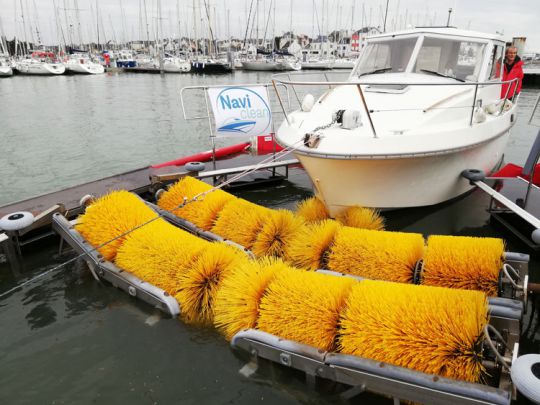
Feasible and profitable?
But before investing, Olivier wants to have visibility, especially with port managers. He has a series of meetings with these nautical professionals, from Brest to Arcachon, and in the Var. Thus, he estimates, a priori, where he will be able to install his machines. These steps are not so easy, because the product is new, and therefore unknown at the moment. Because also, these professionals were scalded by unserious washers, and thus found themselves with installations left to be abandoned. Another more specific reason: in these ports, a careening area is often already available to boaters and often this area is also in deficit. It also employs staff most of the time. So, setting up a station to replace the area in the long term is a fundamental question... In short, the ports, even if they may be interested, remain cautious.
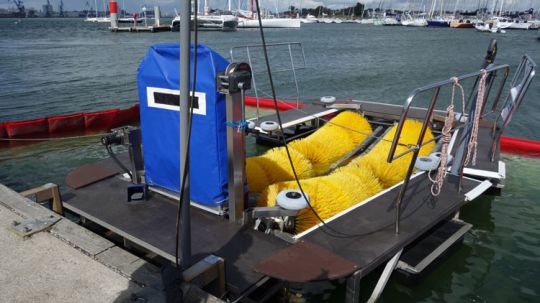
First implementation...
The port of Locmiquélic, opposite Lorient, in Morbihan, is responding favourably: the dry places (out of water) for boats are missing: the hulls of many boats remain submerged and their owners must then treat them regularly. But they don't have the opportunity to do that in this port, because it doesn't have a fairing area. This is harmful for boaters who are forced by law to use a hold with a recovery grid to treat their hull.
Welcome to Locmiquélic!
Another reason why the port of Locmiquélic is taking the plunge: its manager is open to new services. And he also seems to be concerned about the transition from antifouling, which is reputed to be anti ecological, to more sustainable solutions... Olivier therefore obtains a location at the entrance to the port of Locmiquélic. In March 2018, six months after his first steps, he set up his station there. The work is limited: fenders to be positioned at the reception pontoon, the anchoring of the machine on the floating pontoon, the three-phase connection and access to fresh water.
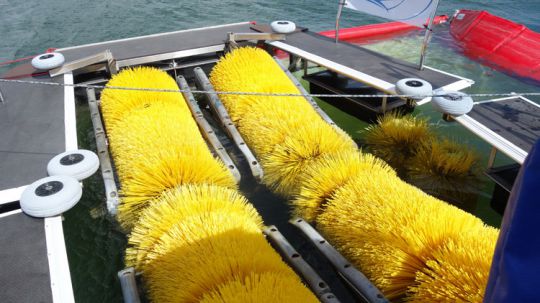
Innovation..
This first implementation is a victory for Olivier who, before being able to launch his activity, had to fight hard to obtain the administrative authorization to install his rollers. It must be said that the regulatory context concerning the use of antifouling has been in turmoil for several years: this aggressive product for algae and shellfish glued to the hulls, is also aggressive for the sea in general. It was not banned, but the producers of this type of product were forced to change the chemistry to one that was too harmful.
... and regulation
In short, add to that the water law which aims to limit pollution, and we obtain a very complicated file to manage for Olivier. It has been imposed the most drastic rules on the protection of the marine environment, even though it considers that rollers are precisely a progressive way of replacing unenvironmentally friendly antifouling. At last, Olivier has reached the end of his difficulties, and will undoubtedly have worked for the future entrepreneurs in his sector in terms of the evolution of official obligations!
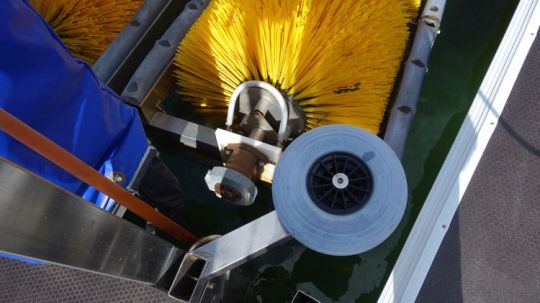
Finally, the launch...
In May 2018, Olivier can finally open his hull washing station... but the fairing season is already over. His customers are only late boaters or eco-lovers who cannot resign themselves to using antifouling. He rolls up his sleeves and goes to meet his customers, pontoon after pontoon, flyers in hand and arguments on the shoulder. He says he is a "pedagogy": he accompanies the evolution of mentalities on ecological lifting. By the end of the 2018 season, it had reached 100 customers. After a review, he realizes that 70% of them have not given antifouling... for an economic reason, but also for an ecological one.
Reasons for a posted interest
From this modest survey, no less than 95% of Naviclean's customers are ready to buy this roller washing service. An encouraging figure... In the order of arrival of the assets of this service in the eyes of Olivier's customers: the speed of the washing, the flexibility of the schedule, the reasonable cost, the professional welcome. The ecological aspect is also mentioned, but further on. And then, the novelty also certainly attracts customers: they don't mention it, but are happy to share photos and videos of the washing and rollers! In 2018, Olivier believes he has worked on his visibility: making contact with yachtsmen's associations, ports, buying advertising in local newspapers... In 2019, he plans to welcome at least twice as many customers, to perpetuate his car wash and become part of the nautical landscape.

 /
/ 